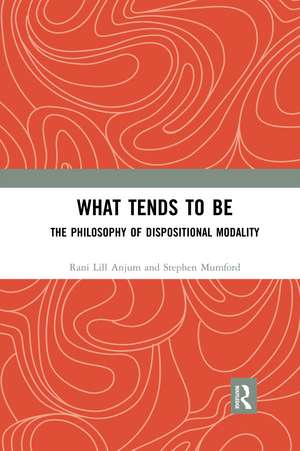What Tends to Be: The Philosophy of Dispositional Modality
Autor Rani Lill Anjum, Stephen Mumforden Limba Engleză Paperback – 14 aug 2020
People tend to enjoy listening to music or watching television, sleeping at night and celebrating birthdays. Plants tend to grow and thrive in sunlight and mild temperatures. We also know that tendencies are not perfectly regular and that there are patterns in the natural world, which are reliable to a degree, but not absolute. What should we make of a world where things tend to be one way but could be another? Is there a position between necessity and possibility? If there is, what are the implications for science, knowledge and ethics?
This book explores these questions and is the first full-length treatment of the philosophy of tendencies. Anjum and Mumford argue that although the philosophical language of tendencies has been around since Aristotle, there has not been any serious commitment to the irreducible modality that they involve. They also argue that the acceptance of an irreducible and sui generis tendential modality ought to be the fundamental commitment of any genuine realism about dispositions or powers. It is the dispositional modality that makes dispositions authentically disposition-like. Armed with this theory the authors apply it to a variety of key philosophical topics such as chance, causation, epistemology and free will.
| Toate formatele și edițiile | Preț | Express |
|---|---|---|
| Paperback (1) | 383.12 lei 6-8 săpt. | |
| Taylor & Francis – 14 aug 2020 | 383.12 lei 6-8 săpt. | |
| Hardback (1) | 764.20 lei 6-8 săpt. | |
| Taylor & Francis – 29 mai 2018 | 764.20 lei 6-8 săpt. |
Preț: 383.12 lei
Nou
Puncte Express: 575
Preț estimativ în valută:
73.31€ • 76.55$ • 60.54£
73.31€ • 76.55$ • 60.54£
Carte tipărită la comandă
Livrare economică 15-29 aprilie
Preluare comenzi: 021 569.72.76
Specificații
ISBN-13: 9780367590871
ISBN-10: 0367590875
Pagini: 208
Dimensiuni: 156 x 234 x 11 mm
Greutate: 0.3 kg
Ediția:1
Editura: Taylor & Francis
Colecția Routledge
Locul publicării:Oxford, United Kingdom
ISBN-10: 0367590875
Pagini: 208
Dimensiuni: 156 x 234 x 11 mm
Greutate: 0.3 kg
Ediția:1
Editura: Taylor & Francis
Colecția Routledge
Locul publicării:Oxford, United Kingdom
Public țintă
Postgraduate and UndergraduateCuprins
Preface Part I: Modality 1. Theory: Introducing the dispositional modality 2. History: Forebears of the dispositional modality Part II: Metaphysics 3. Chance: Overdisposed 4. Causation: Causation and quantum mechanics (with Fredrik Andersen) Part III: Logic 5. Conditionals: Carnap and the Anglo-Austrian conspiracy against dispositions 6. Conditional probability: Conditional probability from an ontological point of view (with Johan Arnt Myrstad) Part IV: Epistemology 7. Perception: What we tend to see 8. Metascience: What we tend to know Part V: Ethics 9. Value: Dispositions and ethics (with Svein Anders Noer Lie) 10. Free will: Causation is not your enemy. Afterword Bibliography Index
Notă biografică
Rani Lill Anjum is Research Fellow in Philosophy at the Norwegian University of Life Sciences, Ås, Norway.
Stephen Mumford is Professor of Philosophy at Durham University, UK and Professor II at the Norwegian University of Life Sciences, Ås, Norway.
Stephen Mumford is Professor of Philosophy at Durham University, UK and Professor II at the Norwegian University of Life Sciences, Ås, Norway.
Recenzii
"This is an admirable book. Anjum and Mumford advance a novel philosophical thesis, they defend it with rigour and ingenuity and explore uncharted territories. Given that the map of the area is currently being drawn there are bound to be inaccuracies and infelicities. But that's the fate of all explorers, philosophical or otherwise. Despite our critical points, Anjum and Mumford have succeeded in producing a thorough, deep and challenging exploration of these metaphysical matters." - Stathis Psillos and Stavros Ioannidis, Notre Dame Philosophical Reviews
Descriere
People tend to enjoy listening to music or watching television, sleeping at night and celebrating birthdays. What should we make of a world where things tend to be one way but could be another? This book explores these questions and is the first full-length treatment of the philosophy of tendencies.
